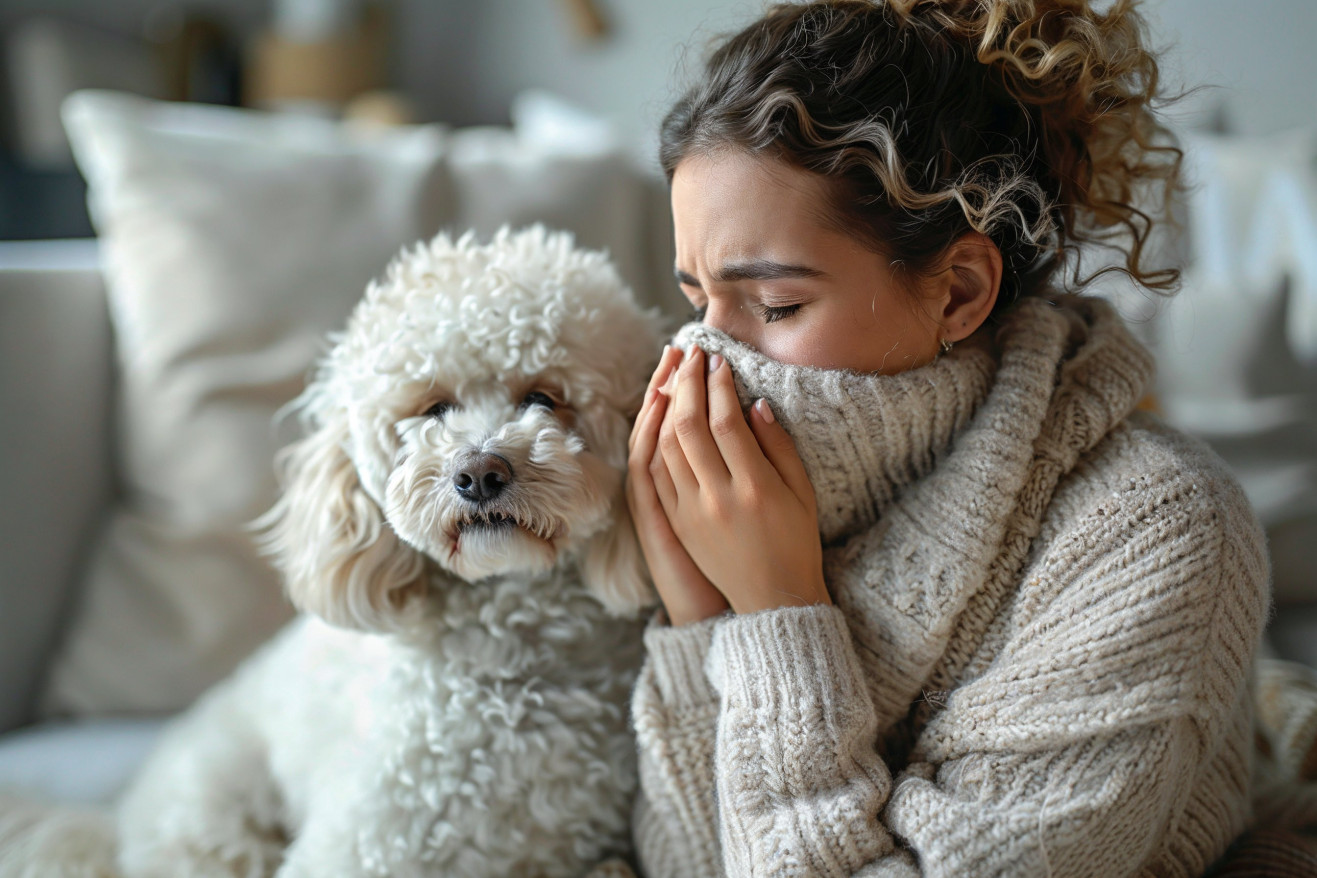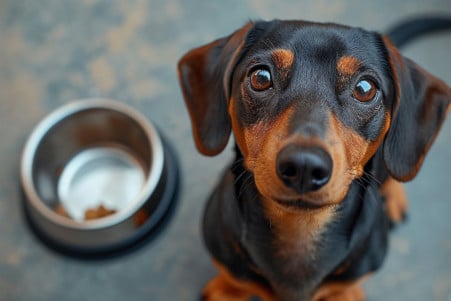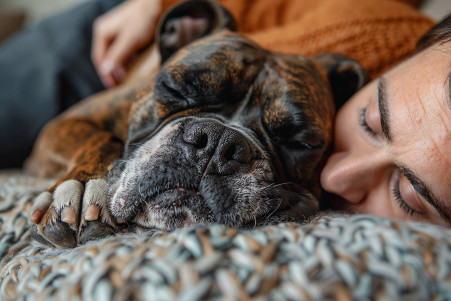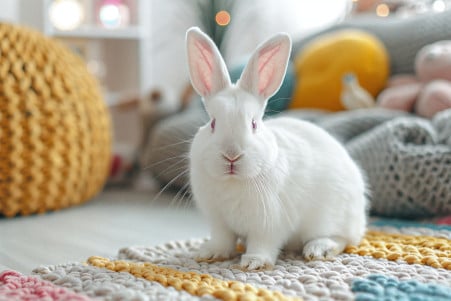Why Do My Dog's Farts Smell So Bad? The Science Behind Stinky Gas
23 May 2024 • Updated 23 May 2024

If you've ever found yourself asking this question, you're not alone. Dog farts are stinkier than human farts for a few reasons, including the fact that dogs eat a high-protein diet and have different gut bacteria. The proteins and other nutrients in dog food are broken down in the gut to create smelly gases like hydrogen sulfide, indole, and skatole. Dogs also have a harder time digesting some nutrients, which can lead to stinkier gas.
While it's not the most pleasant topic, this stinky situation is a great way to explore the science of flatulence and dog digestion. This article will explore studies from animal nutritionists, veterinarians, and biochemists to find out exactly what makes Fido's gas so smelly. You'll learn how a dog's diet, gut microbiome, and biological processes are different from humans and contribute to their particularly noxious farts. By the end, you'll have a better understanding of the intricate digestive system of our furry friends.
Why do my dog's farts smell so bad?
Diet and Smelly Dog Farts
A dog's diet is one of the most common reasons for excessive and stinky farts. Foods that are high in non-absorbable sugars like soybeans, beans, and dairy are often the cause of increased gas, according to Elmo's Kitchen. The bacteria in the dog's gut ferment these sugars that the dog can't digest, and this fermentation process leads to the production of both odorless gases and sulfur-containing gases.
In addition to non-absorbable sugars, high-protein, high-fat, and fiber-rich foods can also lead to increased gas in dogs. Certain proteins and fats release hydrogen sulfide gas during the digestion process, according to the American Kennel Club, and this can lead to stinky farts. Meanwhile, fiber-rich foods like bran, soy hulls and pea fiber can lead to increased flatulence, according to Elmo's Kitchen.
To reduce the chances of stinky farts, it's best to feed your dog a diet that's highly digestible and consistent while avoiding the foods that are most likely to cause issues. Modern Dog Magazine recommends that owners of gassy dogs avoid foods that are known to cause gas in humans, like cruciferous vegetables. Meanwhile, a diet that's made up of easily digestible proteins and carbs, like rice, can help reduce the amount of smelly residue that's left for the bacteria in the gut to ferment.
Medical Conditions That Cause Foul-Smelling Gas
In some cases, especially if the problem is chronic, foul-smelling gas in dogs can be a sign of an underlying medical issue, according to PetMD. Some of the most common causes include gastrointestinal disorders, food sensitivities, intestinal parasites, and inflammatory bowel disease. Less common causes include pancreatitis, colitis, and malabsorption syndromes.
According to Dogster, if a dog is experiencing gas along with other symptoms like vomiting, diarrhea, or a lack of appetite, they should be taken to the vet. Meanwhile, according to VCA Animal Hospitals, if a dog is experiencing sudden, frequent, or severe gas, it could be a sign of a more serious medical issue that requires treatment.
If a dog is experiencing ongoing gas or gas along with other symptoms, it's best to see a vet. In addition, if a dog is experiencing ongoing gas or gas along with other symptoms, it's important to see a vet. In order to manage foul-smelling or excessive gas in dogs, it's important to get to the bottom of any medical issues that could be causing the problem.
Home Remedies and Natural Solutions for Dog Gas
Natural solutions should only be considered after ruling out any medical concerns with a vet, as noted by Raised Right. Gas can be minimized by feeding your dog a high-quality, low-processed diet and making dietary changes gradually, according to PetPlate.
Natural solutions such as probiotics, ginger, fennel, and digestive enzymes can help improve digestion and reduce the smell of gas, according to NaturVet and Dr. Marty Pets. Slowing down fast eaters, massaging your dog’s stomach, and using slow-feeder bowls can also help, according to PetPlate. For mild gas, supplements like simethicone, charcoal, or peppermint oil can be used to provide temporary relief, according to Dr. Marty Pets.
How to Deal With Gas on a Raw Food Diet
While gas is a common side effect of raw food diets, there are a few things you can do to help your dog deal with it. According to the Dog Forum, the high protein and low carbohydrate content of raw diets can lead to especially stinky gas. Gas can also be a side effect of switching to a raw diet too quickly or introducing new proteins.
To help your dog's digestive system adjust to a raw diet, Dr. Dobias suggests adding 0.5 to 1.5 teaspoons of raw, organic apple cider vinegar to your dog's meals. You can also help your dog's digestive system by adding probiotics and digestive enzymes to their diet, as recommended by Keep the Tail Wagging.
According to Dog Chef, it's best to gradually introduce your dog to a raw diet and keep an eye out for any negative reactions. This will help you and your dog avoid any gas-related issues that may come with the dietary change.
Prevention and Management Strategies
Feeding your dog a consistent, high-quality diet is the best way to prevent dog farts, according to Hill's Pet. Gas can be minimized by slowly introducing new foods and avoiding dietary changes, according to Wag!.
In addition, exercise and maintaining a healthy weight can help with digestion and reduce gas, according to Union Lake Veterinary Hospital. Gas can also be reduced by using slow-feeder bowls and making sure dogs don't gulp or swallow air while eating, according to Union Lake Veterinary Hospital.
Finally, it may be necessary to watch for food allergies or intolerances and adjust the diet as needed, according to PetMD. By following these prevention and management strategies, dog owners can help prevent their pets from experiencing excessive or smelly gas.
Conclusion: Dealing With the Stink
As unpleasant as they may be, stinky dog farts are a normal part of a dog's digestive system. That said, it's important to know the causes of dog farts, including diet, gut health, and potential health problems. According to the American Kennel Club, certain proteins and fats release hydrogen sulfide gas as a by-product during digestion, which leads to smelly dog farts.
By taking steps to prevent and manage the problem, you can reduce the amount of gas your dog passes and the smell that comes with it. As Wag! explains, feeding your dog a consistent, high-quality diet and making any dietary changes gradually are important. If your dog's gas doesn't improve or if you notice other symptoms, it's best to see a vet.
By being patient and taking the right steps, you can learn to accept the occasional stinky dog fart as part of life with your pet. As Modern Dog Magazine points out, all dogs pass gas, and by understanding the causes, you can learn to manage this normal part of a dog's digestive system.


